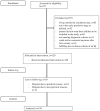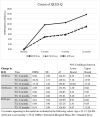Remission with or without comorbid substance use disorders in early psychosis: long-term outcome in integrated care (ACCESS III study)
- PMID: 38187418
- PMCID: PMC10768197
- DOI: 10.3389/fpsyg.2023.1237718
Remission with or without comorbid substance use disorders in early psychosis: long-term outcome in integrated care (ACCESS III study)
Abstract
Introduction: Schizophrenia-Spectrum-Disorders are associated with poor long-term outcome as well as disability and often severely affect the lives of patients and their families often from symptom onset. Up to 70% of first episode psychosis (FEP) patients suffer from comorbid substance use disorders (SUD). We aimed at studying the course of illness in FEP patients within evidence-based care, with and without comorbid SUD, to examine how decreased, remitted or persistent substance use impacted rates of a combined symptomatic and functional long-term recovery compared with patients without SUD.
Methods: ACCESS III is an integrated care model for FEP or patients in the early phase of non-affective and affective psychotic disorders. Treatment trajectories of patients, who had been in ACCESS care for 1 year, with and without SUD were compared with regard to the course of illness and quality of life using Mixed Model Repeated Measures (MMRM) and recovery rates were compared using binary logistic regression. Change in substance use was coded as either persistent, decreased/remitted or no use.
Results: ACCESS III was a prospective 1-year study (N = 120) in patients aged 12-29 years. Of these, 74 (61.6%) had a comorbid SUD at admission. There were no group differences regarding the course of illness between patients with or without comorbid SUD or between patients with a substance abuse or substance dependence. The only outcome parameter that was affected by SUD was quality of life, with larger improvement found in the group without substance use (p = 0.05) compared to persistent and remitted users. Using LOCF, 44 patients (48.9%) fulfilled recovery criteria at the endpoint; recovery did not differ based on substance use status.
Discussion: SUD and especially substance dependence are common in psychotic disorders even in FEP patients. Evidence-based integrated care led to long-term improvement in patients with comorbid SUD and rate of recovery did not differ for patients with substance use.
Keywords: assertive community treatment; first episode psychosis; integrated care; recovery; remission; substance use.
Copyright © 2023 Rühl, Lambert, Rohenkohl, Kraft, Daubmann, Schneider, Luedecke, Karow, Gallinat, Leicht and Schöttle.
Conflict of interest statement
ML: Consultant or speaker fees AstraZeneca, Bristol-Myers Squibb, Lilly Deutschland GmbH, Janssen Cilag GmbH, Lundbeck GmbH, Otsuka Pharma GmbH, Roche Deutschland Holding GmbH, Sanovi Aventis, and Trommsdorff GmbH & Co. KG. AK: Consultant or speaker fees from AstraZeneca, Bristol-Myers Squibb, Lilly Deutschland GmbH, Janssen Cilag GmbH, Lundbeck GmbH, Otsuka Pharma GmbH, and Roche Deutschland Holding GmbH. DL: Speaker fees Janssen Cilag GmbH. JG: Speaker fees from Lundbeck GmbH, Otsuka Pharma GmbH, and Janssen Cilag GmbH. DS received honoraria for lectures from, or has been an advisor to, Janssen GmbH, Lundbeck GmbH, Otsuka Pharma GmbH, Recordati, Rovi, and Takeda. The remaining authors declare that the research was conducted in the absence of any commercial or financial relationships that could be construed as a potential conflict of interest.
Figures
References
LinkOut - more resources
Full Text Sources



